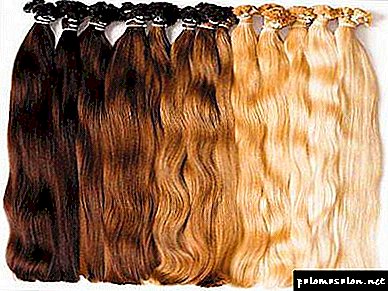At the first suspicion of the development of alopecia, it is necessary to consult a doctor whose profession is called a trichologist. This is a specialist of a narrow focus who knows all about the causes of baldness and deals with his treatment. The trichologist will conduct a comprehensive diagnosis of the disease, write out the necessary treatment.
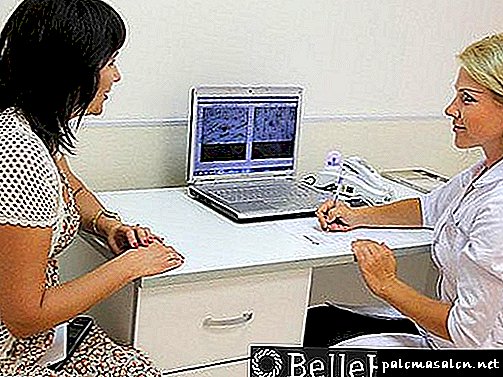
If necessary, the trichologist can connect other specialists (dermatologists, endocrinologists, gynecologists) to clarify the reasons for the development of pathology or the correction of the already prescribed treatment.
When to contact a trichologist
Hair loss is a natural result of changes in the work of internal organs and systems. If the hair falls out moderately (the rate is up to 100 pieces per day) and evenly over the entire surface of the head, then you should not worry too much.
Contact trichologist should be with active baldness,accompanied by the following pathological processes:
- Seborrhea - A fungal disease, the clinical picture of which is manifested in the peeling of the skin, dandruff, itching, redness. Ignoring seborrhea can cause severe complications, such as seborrheic eczema.
- Split ends of hair in women indicate that the body is disturbed by the balance of hormones, vitamins and microelements. The doctor writes out the necessary directions for examination, the results of which can determine the cause of this problem.
- Early gray hair. Normally, the first gray hairs appear after thirty-five years. Early gray hair requires expert advice, as it may indicate a violation of metabolic processes, diseases of the digestive system, anemia.
How to prepare for the visit
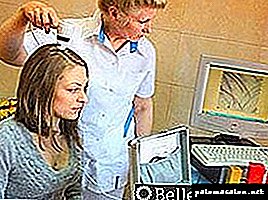 Before you go to the office of trichologist, you need to prepare. Compliance with some of the recommendations will help in an objective assessment of the state of hair and a correct diagnosis:
Before you go to the office of trichologist, you need to prepare. Compliance with some of the recommendations will help in an objective assessment of the state of hair and a correct diagnosis:
- A few days before the visit to the doctor do not wash your hair.
- Do not change the shampoo on the eve of the trip to the trichologist.
- Do not use mousses and hair sprays, as well as tight weaving styling.
Attention! It is important to provide the doctor with unhindered access to any study area.
Diagnostic methods
High-quality and complete diagnosis of baldness consists of three main stages:
Stage 1: initial examination and consultation. The trichologist examines the hair with a trichoscope, talks with the patient, ascertaining the presence of current diseases, chronic pathologies. After examination, the specialist decides on the need for additional surveys, consultations with other specialists.
Stage 2: conducting instrumental methods of diagnosing alopecia:
- Trichogram is carried out with the help of a trichoscope (special micro video camera). With its help, the doctor gets the opportunity to accurately determine the thickness and density of the hair.
- Phototrichogram allows you to visually assess the standing of the skin of the head, to identify foci of peeling and redness, to measure the number of follicles per 1 cm. square. hairline.
- Trichoscopy done with a dermatoscope. Acting on the principle of a magnifying glass, a dermatoscope allows a detailed study of the state of the hair follicles.
- Phototrichoscopy held on a pre-shaved part of the head. The trichologist assesses the state of the follicles, calculates the ratio of growing and already dying hair.
- Spectral analysis of hair carried out to determine the deficiency or excess of certain trace elements, as well as the presence of toxic substances that affect the condition of the hair.
- Biochemical analysis of hair allows you to determine the level of adenosine triphosphate, the lack of which slows down the growth and provokes active baldness.
Stage 3: After all examinations, a second consultation of the trichologist is appointed, where the patient is diagnosed with a diagnosis and a plan for future treatment.
Treatment methods
 The maximum effect of treating baldness can be achieved only with an integrated approach. The doctor uses the following combination of techniques:
The maximum effect of treating baldness can be achieved only with an integrated approach. The doctor uses the following combination of techniques:
- Drug treatment involves the intake of vitamin complexes, compensating for the lack of vitamins, trace elements and amino acids in the body.
- Cosmetic procedures. The most effective and popular procedures for hair restoration:
- Ozone therapy. Through the deep penetration of oxygen into the scalp, blood vessels are stimulated, the nutrition of the hair follicles is improved.
- Cryotherapy. The damaged areas of the scalp are frozen with liquid nitrogen. As a result, the blood flow is activated, hair follicles are strengthened, the growth of new hairs is stimulated.
- Iontophoresis. Into the scalp are injected substances that strengthen hair follicles.
- Myostimulation. The procedure using pulsed current quickly restores the disturbed balance of hormones and the metabolism of the skin of the head.
Endocrinologist
 Often the cause of alopecia is endocrine disruption Diseases that provoke active hair loss: diabetes, thyroid disease, autoimmune diseases.
Often the cause of alopecia is endocrine disruption Diseases that provoke active hair loss: diabetes, thyroid disease, autoimmune diseases.
An endocrinologist is able to accurately diagnose the pathological process, paint a course of necessary treatment and give recommendations, the implementation of which improve the condition of the hair and reduce the manifestations of alopecia.
The lack of beneficial trace elements and vitamins in the body leads to a violation of protein digestibility. As a result, skin, nails and hair are affected. Consultation of a nutritionist will help to adjust the regime and the diet.
Gastroenterologist
Problems of the functioning of the digestive system vividly manifested in the appearance of man. First of all hair suffer. They lose their luster and elasticity, start to fall out strongly. A gastroenterologist is able to diagnose and cure a disease that provoked alopecia.
Solve the problem of active hair loss caused by prolonged stress and nervous tension, only a competent psychologist.
The result of hormonal disorders, caused by various diseases of the pelvic organs and childbirth, is excessive hair loss. To diagnose and eliminate the cause of the development of alopecia can gynecologist according to the results of the research and laboratory tests.
The success of baldness treatment directly depends on timely referral to the trichologist, competent approach to treatment, following his advice and support, if necessary, specialists from other areas.
Useful videos
Trichologist on the causes of hair loss.
Androgenic alopecia: endocrinologist answers your questions.
Are there any norms for hair loss?
Just want to warn readers that you should not panic ahead of time. If you lose between 50 and 150 hairs daily (depending on the size of your hair), this is normal. Remember that the follicles on the head are updated regularly, and no matter how hard you try, you cannot completely prevent hair loss. But if you find that your hair is thinning beyond measure, then you should start worrying. So which doctor to contact if hair with a root falls out?

A man who knows all about hair loss
The trichologist does not conduct a reception in a regular clinic, his orientation is too narrow. This doctor is studying the problems associated with diseases of the scalp and hair damage. And what should those who do not have the financial capacity to visit a trichologist in a private cosmetology clinic or live in a rural area do? In the event that you notice that your hair has started to fall out, which doctor should you go to? An alternative does exist. Since trichology is a section of cosmetic dermatology, you can make an appointment with a dermatologist. This specialist conducts a reception at any clinic, including in rural areas.
Simple test
Many women love long hair, and sometimes the total mass dropped out can be misleading. In order to absolutely sure that your hair has thinned beyond measure, count the number of hair lost per day. For a more accurate result, we recommend that you do not wash your hair for a day or two before the experiment. In the morning you can count the remaining hairs after a nap on a pillow. Then brush your hair with a clean comb and count how many more of them remain on the bristles. Record the result in a notebook.
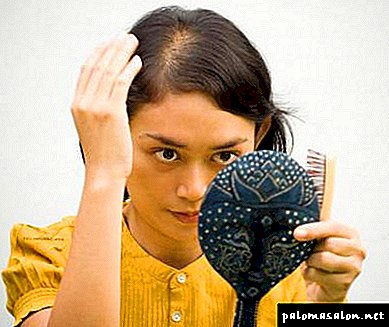
During the day, after each combing, observe how much hair you will lose additionally. Do not forget to inspect the clothes. Wash your head at the end of the day, just remember to close the drain hole. Everything that remains in the bathroom or on your hands should also be recounted. This is quite a laborious process, but the only way you will know with absolute precision is how much hair you lose every day.
Depending on age
So, we found out that all people lose their hair. What doctor should be consulted if the daily loss rate is exceeded? Trichologists or dermatologists will examine your problem in detail, consult and prescribe the necessary treatment. If you regularly visit cosmetology salons, you can contact a cosmetologist. But did you know that depending on age, problems with hormonal shifts, and also hair pigment, the daily rate of hair loss may vary?
Thus, in adolescents in the transition period, up to 10% of the follicles on the head actively die. Therefore, the question of which doctor to go to if a child’s hair falls out should be considered in context with the characteristics of the functioning of the child’s body. Do not panic ahead of time if you notice this problem when combing a child. During the period of active growth of children (age from 3 to 7 years), most of the hair follicles are in the active phase. Well, if your 10-year-old daughter still has excessive loss, this is a reason to make an appointment with a dermatologist or a trichologist. Recall that by the transitional age, during active hormonal adjustment, the average rate of hair loss again increases. Do not forget about the features of hormonal during pregnancy and lactation. Most often, excessive hair loss during these periods is a temporary phenomenon.

Depending on the hair pigment
So, you made the counting procedure and found out that your hair falls out badly. Which doctor to consult, you already understand. Did you know that, depending on the natural pigmentation, every woman loses a different amount of hair every day? So, for example, natural blondes have the most bulbs on their heads - up to 150,000. Their hair is rather thin, therefore women naturally losing blonde-haired hair have more hair than brunettes or red-haired beauties. The rate of loss for blondes ranges from 100 to 150 hairs per day. Natural red-haired young ladies also have thick hair. On the head of the average "redhead beast", there are about 80,000 follicles. Therefore, the rate of loss for them varies from 70 to 90 hairs daily. Natural brunettes have from 100 to 110 thousand bulbs, so their daily loss rate is set in the region from 80 to 110 hairs.

Causes of Fallout
If the hair falls out, which doctor to contact, we found out. Now let's talk about the causes of significant losses. In fact, there are a lot of them, we will list only the main ones.
- Excessive fascination with repainting hair and styling products. Many women often dye their hair, and do it at home, using cheap dyes. After the next procedure, the curls more than ever need additional protection. This should not be forgotten. Also, some beauties are too zealous in hair styling, putting too many cosmetic compositions on the hair: foam, mousses and varnishes. All this spoils the scalp and impairs the sebaceous glands. Tip: the more hair is in its natural state, breathe, the better for the skin. For the same reason, in the case of hair loss is to abandon too tight hairstyles.
- Improper nutrition. For the normal functioning of the bulbs on the head must be powered not only from the outside, but also from the inside. Thus, women who are accustomed to sit on hard diets, often face the problem of hair loss, rather than those who have a balanced diet. Tip: If you are on a tight diet for a long time, do not forget to enrich your diet with raw vegetables, fruits and multivitamins.
- Bad ecology and hard water. If you do not know why hair falls out (which doctor you should contact, we examined in detail in the materials of this publication), then you shouldn’t discount the polluted conditions of the megalopolis and hard, low-quality water in apartment buildings. Tip: soften the water by boiling.
- Violation of cerebral circulation. This problem is more profound and is treated by a therapist and a neurologist. However, not only the brain, but also the follicles on the head suffer from insufficient inflow to the cells of the head.

We familiarized with the main reasons why hair falls out. What kind of doctor to contact if you find unpleasant symptoms, you know. In any case, the doctor will examine the internal state of the body, prescribe appropriate tests and based on the results will give individual recommendations.
Other professionals working on this issue.
Did you know that medication may be involved in the problem of excessive hair loss? Study in detail the instructions of the drug that you are taking, and find out if there is a marked side effect there. We have already noted that the hormonal background of the body is slightly altered in different periods (child, teenage, postpartum). Male baldness is associated with an excess of the hormone testosterone. However, women have similar problems.
If a trichologist or a dermatologist did not help you, and your hair still falls out badly, which doctor should you contact in this case? Then the gynecologist-endocrinologist will help you. The fact is that some women may have problems with the thyroid gland. You should worry if cosmetological treatment does not have the desired effect, and the hair itself becomes excessively greasy the next day after washing. The gynecologist-endocrinologist will prescribe a biochemical blood test, a hormone test, and also check the functioning of the thyroid gland.

General examination for excessive hair loss
Now you know which doctor to contact if hair falls on your head. In women, this problem is particularly acute. If men usually do not worry about thinning hair, then representatives of the beautiful half of humanity are not ready to say goodbye to their hair. Now we will get acquainted with the examination and treatment prescribed by the trichologist. In any case, no analysis can not do.The most obvious measure is blood donation for biochemistry, and blood tests for vitamins, minerals and hormones are additionally prescribed. The specialist also examines the patient's hair structure in order to determine the mineral status and makes a trichogram.
General treatment
If the hair falls out, which doctor to contact, now you know. After passing the tests and proper tests, the trichologist prescribes a special homeopathic treatment with preparations containing minoxidol, laser therapy and head massage, and also gives recommendations regarding special restoring shampoos, cosmetic masks and correction of the patient's nutrition.
 Now our readers are aware of which doctor to go to if their hair falls out. We hope our article was helpful.
Now our readers are aware of which doctor to go to if their hair falls out. We hope our article was helpful.
The problem of hair loss: when you need to go to the doctor
Hair is a mirror of a person and an indicator of his health. Thick and silky strands create not only external beauty and attractiveness - they signal that the body receives enough vitamins and minerals, is not subjected to stress.
The problem of hair loss affects many men and women. It is necessary to understand in which cases the falling locks are the norm, and in which cases it is already necessary to sound the alarm.
The human body is designed so that the daily dying off and the loss of part of the hair is a natural process. The life span of one hair is about three years. On the day, each of us loses 50-100 hairs per day.
In women, this figure can increase to 150 hairs. Most often, hair falls out when combing and shampooing.
Such a process is necessary for a short “respite” of hair follicles - after a few days, a new one begins to grow in place of the old hair that has fallen out. Often women notice strands with hairs of various lengths - new curls grow.

However, it happens that the hair is significantly thinning in a short time. If the hair falls out in whole bunches or the number of lost hairs exceeds the daily norm, this is a reason to consult a doctor.
Another sign of incipient baldness is a reduction in the number of hairs in some local area by 10-50%.
Specialists will determine the causes of this problem and select the correct treatment. Intensive loss of curls often has a medical nature, therefore, the advice of many specialists will be required.
It is important for women to remember that during pregnancy, lactation and immediately after birth the hormonal background of the body changes. Hormonal changes can cause intensive strand fallout, but this is not a reason to consult a doctor.
It is enough to use firming masks and cosmetic preparations, to consume enough vitamins and minerals, to relax more and not to succumb to stress. When the body is rebuilt into normal mode, this problem will go away.

- Comprehensive treatment of androgenic alopecia in women: causes, course and diagnosis of the disease.
- How to strengthen the hair from the loss of folk remedies using a variety of masks, read here.
Consultation of a trichologist: general provisions
A doctor who treats hair and scalp is called trichologist. This is the main specialist to contact.. After analysis, it will be clear whether you need to visit other specialists.
Trichology is a relatively young science. She is engaged in the development of methods for the recovery of hair and the prevention of diseases of the scalp.
The first trichologists appeared at the beginning of this century and have not yet become widespread. In small towns such specialists may not be. Trichology is a section of dermatology, so a dermatologist can also replace a trichologist.
The trichologist should be contacted if you identified one or more of the following symptoms:
- Intensive baldness all over the head or in one local area
- Strands become brittle and dull, easily pulled out
- Itching, redness and inflammation of the scalp, abundant dandruff
- Hair grows too slowly or does not grow at all
- Change in natural coloring of curls

Do not wash your hair before visiting a doctor - do it two or three days before going to a specialist. Use the shampoo that you usually use. So the doctor will be easier to see the overall picture of care for the hair.
Do not braid tight braids and do not make complicated hairstyles - the trichologist should easily get to your strands and their roots in order to conduct all the necessary research.
To get to the consultation to the trichologist, you need to contact a paid clinic. State institutions do not have such doctors as good hair specialists, since this specialty is not included in the All-Russian classifier of occupations.
In-depth knowledge and skills are received by future trichologists during courses at medical universities. The price of one consultation of a specialist in trichology depends on the prestige of the clinic and the region.
In large cities, one visit to a trichologist will cost at least a thousand rubles, although often the cost of consultation reaches up to one and a half thousand. In small towns, you can pay 500-700 rubles for talking with a doctor and an examination.
Most likely, you will not limit your visit to a specialist. On the diagnosis and treatment of hair may take from one to several months.
Diagnostic procedures

- Photography
Using a “sensitive” technique with a custom flash, the doctor captures the scalp and strands in a photo under certain light conditions. This procedure is performed at the beginning and end of the treatment of the strands in order to assess their health status and see the result of the treatment.
Trichoscopy
This is a diagnosis using a special microscope - a trichoscope. To study the causes of hair loss, the trichologist examines the surface of the scalp and determines the condition of the hair follicles and the thickness of the hair. 2-3 hairs should grow from each follicle. If their number is less, it speaks of the problem of baldness.
By attaching the trichoscope to the computer, you can see the program for processing the results of treatment and the current state of the patient. A phototrichogram captures hair loss and controls changes in the surface of the scalp. The frequency of such a procedure is once every two days.
Additional analyzes
Diagnosing the problem of strand fallout requires an integrated approach. To study the condition of the body, a specialist prescribes a variety of tests.
Among them are clinical blood and urine tests, hormone and biochemistry tests, body iron, blood tests, and infections.
Other tests - a biopsy of the scalp for the presence of fungal infections and spectral analysis of hair.
In the case of itching, severe flaking of the scalp, abundant dandruff or folliculitis, the doctor takes biological material for analyzes to detect bacteria.

- We learn how to use salt for hair from falling out and for growth at home.
- Find out what the rate of hair loss per day in women is by reference.
Means and methods of hair restoration prescribed by trichologists

According to the results of tests and diagnostics, the trichologist will prescribe a complex treatment. Methods for repairing damaged strands are combined into the following groups:
- External use of cosmetic preparations to strengthen the strands - medical shampoos, balms, masks, tonics, scrubs, ointments, lotions, etc.
- The ingestion of vitamin complexes and medicines - drugs to improve blood circulation, corticosteroids, antifungal drugs
- Physiotherapy
- Manual massage of the scalp, which improves blood circulation and promotes better absorption of nutrients
The doctor treating hair can prescribe the following oral medications - dietary supplements “Rinfoltil”, “Selentsin”, “Expert Hair”, vitamin and mineral complexes “Perfectil”, “Alerana”.
Strengthening and curative for the hair of the drug is “Pantovigar”. Taking Revalid capsules, you can restore hormonal imbalance and improve metabolic processes.
Physiotherapy treatments

- Darsonvalization
This procedure involves exposure to current on the hair follicles for active growth of the strands. Thanks to it, puffiness is removed, blood circulation is improved, the cells are saturated with oxygen, the work of the sebaceous glands is stabilized. Treatment course - from five to fifteen procedures.
Plasma lifting
Another name for this method is PRP therapy. It involves the introduction into the scalp of the patient's blood plasma, saturated with platelets. Platelets secrete special molecules that promote the improvement of hair follicles and the growth of hair. The number of injections in one course of treatment is from three to five.
Microcurrent therapy
The procedure involves exposure to electrical discharges on problem areas. The current is low here, so patients do not feel pain. After the course of treatment, metabolic processes in the scalp are improved, tissues are restored. The required number of sessions - from ten to twelve.
For hair treatment, the trichologist injects vitamins and trace elements into the deeper layers of the skin with the help of current. Iontophoresis has a positive effect on blood circulation and improves metabolism in the skin. The duration of treatment is 8-12 sessions.
In the most difficult cases, when all methods do not help, doctors recommend surgery - hair transplantation. However, this procedure has several contraindications - some diseases and intolerance to drugs for anesthesia.
Other experts who will help in solving the problem.
It is not always necessary to go first to a paid consultation to the trichologist. If you have problems with hair, you can contact other doctors from the state clinic.
Consult with experts, hand over all necessary tests. - Perhaps, intensive strand fallout is associated with diseases according to their profile. Below is a list of doctors you need to visit.

- Dermatologist
Trichology is a branch of dermatology, therefore a competent dermatologist will cure diseases of the scalp better than a trichologist. Consultation with a dermatologist is necessary if you are concerned about folliculitis, seborrhea, itching, redness or peeling of the skin. Most often, this problem is associated with a fungal infection. Hair in such cases can intensively fall out or break off near the roots.
Endocrinologist
One of the causes of baldness is endocrine problems. If you have thyroid disease, the endocrinologist is the first doctor to visit. In addition, the endocrinologist will prescribe tests for the level and balance of hormones - hormonal disruptions occur during puberty and during the restructuring of the body (pregnancy, childbirth, lactation). Signs of hormonal disorders - dry or oily scalp.
Gynecologist
A gynecologist should regularly visit every woman. Many women notice that in the early stages of pregnancy, the structure of the hair changes and they begin to fall out in whole strands. The doctor will tell you how to improve the hair and scalp without harm to the unborn baby.
Gastroenterologist
A common cause of hair loss is unbalanced nutrition and lack of nutrients. A gastroenterologist or nutritionist will help you create a healthy diet and get rid of problems with your stomach or intestines.
Therapist
At the beginning of any illness, it is worth visiting a therapist. He will assess the general condition of the body and prescribe the main tests - a blood test for hormones and biochemistry, clinical blood and urine tests. With the results of these analyzes, the therapist will refer to the right specialists.
Stress is another cause of hair problems. The psychologist will advise how to balance the nervous system with psychotherapy or drugs.
Do not independently engage in the treatment of hair loss - contact your doctor. Most often, this disease requires a complete examination of the body. If you do not eliminate the causes of baldness, the treatment of damaged hair will not bring any result.
To entrust the treatment of curls
Any problems associated with the health of the hair and scalp - the scope of the trichologists.
Trichologist- A specialist who is engaged in the prevention and treatment of diseases of the hair and scalp.
Trichology- a science that studies the morphology and physiology of hair, and also develops theoretical and practical methods for the restoration and rehabilitation of the scalp. Translated from the Greek "tricho "-" hair.
Despite the fact that the first studies of hair began to be conducted in 1902 by scientists from the UK, trichology as an independent direction in medicine has existed for only a little more than a dozen years. Therefore, in small towns to find a trichologist is quite difficult. But in the capital, the services of a hair specialist have long been in high demand.
Indications to appeal to trichologist
It is necessary to resort to the help of a specialist in the event of the following problems:
- intense focal or total hair loss,
- brittleness, dullness, depletion of the hair shaft,
- too slow hair growth or a feeling of complete lack of it,
- hair is pulled out easily even with light tension,
- dry and itchy scalp, heavy dandruff, excessive sebaceous glands,
- irritation, redness of the scalp, the appearance of purulent inflammation and unpleasant smell,
- hair pigmentation change.
How trichologist treats hair loss

A doctor specializing in trichology treats not only the hair, but also the epidermis in adults and children. At the first visit, the doctor performs a diagnosis of hair and hair follicles, collects all the necessary information about the state of health, habits, features of work, the mode of the client's day. The resulting picture allows you to immediately identify the boundaries of the search for the causes of hair loss.
In specialized clinics, hair diagnostics is carried out in several stages.
With a strong loss of hair, the attending physician performs photo-recording under standardized conditions of illumination at a certain angle. To do this, use the “sensitive” technique with special flash settings. This stage allows the trichologist and the patient to visually evaluate the result of therapy and make adjustments to the continuation of the course.
Examination of the scalp with a special device (trichoscope) with a multiple increase allows you to assess the condition of the skin, the level of "clogged" pores sebum, activity of hair follicles. An important indicator here is the density of the hair. So, normally 2-3 hairs should grow from one bulb. If this figure is lower, we can talk about a strong loss of curls.
The survey is also carried out using a trichoscope connected to a computer. A specialized program processes the information received and allows you to monitor the results of treatment over time. A phototrichogram is carried out twice with a difference of one day and makes it possible to estimate the ratio of fallen and new hair and the intensity of hair loss. It is worth noting that the camera must have a high resolution in order to cover even the most thinned hairs.
- Examination of patient test results
The doctor who deals with the problem of hair loss, prescribes tests, the purpose of which is to identify the true cause of the disease, without eliminating which superficial treatment will be useless.
What tests are prescribed by the doctor:
- general blood analysis,
- blood biochemistry (shows the content of essential trace elements),
- blood test for infections,
- serum iron (on the likelihood of iron deficiency anemia),
- analysis of the hormones of the reproductive system and the thyroid gland,
- biopsy of the skin (for the presence of a fungal infection),
- spectral analysis of the hair shaft and bulb.
- In-depth study
In the case when there is no unfavorable heredity, and the results of tests do not indicate obvious trigger factors, the doctor decides to conduct an in-depth study of the epidermis and vessels of the scalp, which involves studying at the cellular level.
The presence of bacterial diseases of the scalp can cause intense hair loss. Bacteriological examination is carried out in the presence of appropriate indications: oily or dry dandruff, which is not amenable to treatment, severe itching, folliculitis.
What means the doctor can prescribe
As a rule, on the basis of the data obtained, the doctor prescribes drugs externally (shampoos, tonics, sprays, ampoule drugs) and inside (vitamin-mineral complexes, drugs).
One of the most effective means that has successfully proven itself in trichology is considered an ALERANA ® Spray for external use. Daily use of the spray can significantly reduce hair loss and increase the activity of the hair follicles, which contributes to a noticeable increase in the density of curls. It has been clinically proven that after 6 weeks intensive prolapse stops in 87% of cases. The drug is a drug.
Universal recommendations of the trichologist
Now you know which doctor to refer to if you have severe hair loss. However, if the curls began to break and "crumble" recently, you may simply need to reconsider the daily care.
- Wash your hair with soft water. Tap water is too hard for hair, so it is recommended to soften it, for example, using table vinegar or lemon juice.
- Water temperature should not be too low or too high. Ideally 35-45 ºС.
- Frequent washing removes the protective film of hair, which leads to dryness and brittleness, so use only the shampoo at the roots, and it is enough to clean the ends once a week.
- Do not twitch or injure the roots during washing - movements should be smooth, circular, but not sharp.
- Do not rub the wet curls with a towel. Just build on the head "turban" and let excess moisture soak.
- Once a week, moisturize the scalp with oils that can be bought at each pharmacy - this allows you to restore the epidermis and nourish hair follicles with useful substances.
- Take more responsibility for personal hygiene items - do not give other people your comb or scrunchy. Remember, the microflora of the scalp each has its own, and share it is not worth it.
How much is the consultation trichologist
At the moment, the trichologist profession is not listed in the All-Russian Classification of Occupations (OKPDTR), and, therefore, the state universities do not graduate such specialists. Highly specialized doctors receive their knowledge on paid courses at medical institutes, and, consequently, the rate of the trichologist is not provided for by budgetary medical institutions.
Get a consultation of the trichologist on CHI does not work, you need to seek help from a paid clinic. The price list of the specialist varies depending on the region and the status of the institution. In the province, the cost of admission is somewhat lower, about 500-700 rubles, and in the capital or in one of the major metropolitan areas, 1000-1500 hard earned money will have to be paid for the consultation.
Hair anatomy
All hairs on the human body have the same structure - they consist of a hair follicle (or hair follicle), which contains the hair papilla (it is through it that the nutrients and oxygen are supplied to the hair by blood). Also, the hair has a rod (visible part), which, in turn, is divided into 3 layers:
- medula is the deepest layer that is necessary for the transport of nutrients through the hair,
- Cortex is the thickest layer, which consists of keratin protein and melanin pigment, which gives color to hair,
- the cuticle is the cornified cells that give hair strength (they, like shingles, cover the hair and protect it from negative influences).
What is the life of the hair on the head
All hair goes through several stages of development:
- Anagen - active growth and development of the rod, which can last 3-5 years,
- catagen - separation of the follicle from the papilla and the malnutrition of the hair, this stage takes place within 4-6 weeks,
- telogen - the stage at which the stem with the follicle is finally separated from the papilla and slowly moves to the skin surface; the process takes 3-6 months.
Thus, we can conclude that the average lifespan of a hair is 3-6 years.
The main causes of hair loss
Many factors influence hair growth and health: lifestyle, care, nutrition, climate. And the most common causes of baldness (alopecia) can be:
- genetic predisposition to excessive hair loss,
- unbalanced diet, which includes few vitamins and minerals,
- care that is chosen without regard to the type of hair (the correct care of oily hair can be found in this article),
- poor ecological condition, changes in temperature, humidity and pressure,
- hair coloring with aggressive dyes that contain ammonia (in more detail in this article),
- stressful situations
- diseases of the digestive, endocrine, nervous and immune systems.
From all of the above, we can conclude that it is not always possible to independently determine the cause of hair loss, therefore, it is recommended to consult a specialist. 
Hair falls out: which doctor to contact
If a person first encounters such situations, he may not understand which doctor to contact if hair falls out. And, in most cases, consulting with just one specialist is not enough.
A trichologist is a doctor who treats hair and diagnoses hair diseases, therefore, first of all, you need to make an appointment with him. He will assess the condition of the hair by examining the scalp under a video dermatoscope. Almost always the following studies are also needed:
- biochemical blood test (a complete list of tests for hair loss can be found here),
- a blood test for minerals and vitamins in the body,
- Trichogramma (analysis of lost hair, measuring their thickness).
After receiving the results of the study, the trichologist will give recommendations for the care and treatment of hair.
Dermatologist
You should also refer to this doctor, especially if hair loss occurs suddenly and is accompanied by redness, itching and burning sensation, and dandruff (all causes of dandruff are described here). If the above symptoms are combined with each other, there is a possibility of a disease such as seborrhea (dysfunction of the sebaceous glands) or ringworm (fungal infection of the skin). For the diagnosis of these diseases will be enough seeding scraping from the surface of the scalp.
Infectious disease
This specialist should be consulted if a dermatologist has found a ringworm or other dermatological disease of viral or bacterial origin (origin). In this case, the infectious disease specialist should evaluate general clinical tests (complete blood and urine test, biochemical blood test) and prescribe a comprehensive etiotropic therapy (aimed at the destruction of the pathogen).
How to care for hair if it falls out
Care is an important part of the health of hair, so do not neglect it. Experts recommend:
- select care products according to the type of hair,
- daily to massage the head with special combs,
- don't wipe wet hair,
- give up ploek and hair dryer,
- protect hair from exposure to sunlight, temperature extremes.
If you follow these recommendations, you will forever get rid of excessive hair loss!
Home> Hair> What kind of doctor to contact if hair falls out
Hair Loss Doctor
A doctor who deals with hair and all problems associated with the scalp is called a trichologist.
Doctor-trichologist who is it? It is this specialist who takes measures to prevent and treat diseases of the epidermal cover of the head and hair.
The science of trichology (in translation from Greek “tricho” means “hair”) is based on studying the life cycle of curls, their physiological processes. Also this area of scientific development of theoretical and practical methods for the rehabilitation and restoration of the hair zone of the head.
The earliest studies related to hair, started by British scientists since 1902, but the medical science of trichology appeared only 10 years ago. That is why small towns are unlikely to have a base of such specialists, but residents of large sites have long been using the services of trichologists.
Main symptoms for treating a trichologist
The doctor-trichologist who treats hair should be visited when such symptoms occur:
- zoned or solid fall of strands,
- brittle, devoid of life shine, thin hair shaft,
- a slow increase in length or complete lack of hair growth,
- loss occurs even with little mechanical impact,
- dry scalp, severe itching, dandruff, increased secretion of sebaceous glands,
- irritated areas on the scalp with redness,
- the appearance of inflamed, possibly with purulent content, papules, with an unpleasant smell,
- hair pigment modification.
Taking pictures using standardized parameters
Strong hair loss, gives the trichologist a reason to carry out photofixation in standardized conditions of clarification, with the same position of the head. To do this, use a special "hypersensitive" equipment with custom flash. At this stage, the specialist can already put an assessment of the patient's state of health, as well as subsequently see the effectiveness of the course of treatment for its adjustment.
Computer diagnostics of hair (trichoscopy)
A trichoscope is a special device that operates on the principle of a microscope, repeatedly increasing the surface under study. With its help, it is possible to study the state of the epidermal cover, the degree of occlusion with the sebaceous secret, and also to trace the activity of the hair follicles. One of the main indicators is the density of the hair. In a healthy person, from one follicle grows 2-3 hair shafts, underestimated indices indicate a serious degree of alopecia.
Computerized trichography (phototrichogram)
Another study that uses a trichoscope that is connected to a computer. Camera apparatus has a high sensitivity, which allows you to catch even the smallest hairs. With the help of a specially-developed program, you can process the data, as well as track the dynamics of the effectiveness of the course of treatment.
Referral for additional research
The doctor directs the hair and scalp for additional tests that will help identify the root cause of the disease. If the cause is not eliminated, the local application of the treatment will be ineffective. Possible analyzes:
- clinical blood test,
- biochemical analysis of blood (quantitative indicators of trace elements),
- PCR (indicates active or transferred pathological processes),
- iron in serum (the result may show iron deficiency),
- hormonal tests for suspected thyroid pathology,
- epidermal biopsy (examination of the skin under a microscope for fungal injury),
- spectrogram (spectral analysis of hair)
More detailed study
If the patient does not have a genetic predisposition to hair loss and the outcome of the studies performed did not show the putative mechanisms of the disease, the trichologist may decide in favor of a more in-depth analysis of the skin and vascular system of the head. More detailed studies are conducted at the cellular level.
The study of biological material for the detection of pathogens in it
The cause of hair loss may be the presence of bacterial infection of the epidermis of the head. The study of biological material on bacteria is used for such symptoms:
- epilating folliculitis,
- oily or dry dandruff that defies standard therapy,
- no intense itching.
Medicines that the doctor can apply
Based on the obtained results, the physician for hair trichologist may prescribe the use of external preparations (shampoos, tonics, sprays, preparations in ampoules) and for oral administration (complexes of vitamins and microelements, medical preparations). One of the most popular and effective means is considered "Spray for external use of Alerana". Due to its daily use, alopecia can be significantly reduced in a short time. The drug also contributes to an increase in the activity of hair follicles, which results in a noticeable increase in the density of the hair. Clinical studies have shown that after 1.5 months of regular use of the drug, the loss is reduced by 85%.
Preparing to visit the trichologist (doctor by hair)
It is necessary to decide whether the problem exists as such or whether it is still a natural process of getting rid of dead hair. The most prone to panic are women who are under great stress even with 5 hairs on a comb.
If more than 120 hairs fall out per day, this is a clear reason to write to a specialist.
Before taking a trichologist, it is not recommended to wash your hair, so a specialist will be able to more reliably see the accompanying problems. You also can not use cosmetics for hair styling, make hair out of braids or any other temporarily distorting the structure of the hair. To obtain objective data, the doctor must have the correct information, which is not possible to investigate when applying compositions fixing the hair.
Standard recommendations of the trichologist
Having learned the answer to the question of which doctor to turn to if hair falls out, it is worthwhile to designate standard solutions to the problem. If you find abundant hair loss, thinning hair, experts recommend paying attention to your regular way to care for the strands. Tips for a trichologist:
- water for washing curls should be soft. Hard water coming to us from taps is absolutely not suitable for these purposes. It can be mitigated artificially - by placing the filter on the faucet or oxidizing it by adding table vinegar (lemon fresh).
- The temperature of the water should not be extremely low or high. The ideal temperature is 30-40ºС.
- Frequent washing of the hair contributes to washing off the protective film, making the strands dry and brittle. It is not recommended to wash your hair more often than every three days; at the same time, shampoo can be applied only on the roots, the entire length can be cleaned once in 7 days.
- Cleansing curls should also be resorting to massage movements. So you can stimulate blood circulation, respectively, blood flow to the hair follicles.
- Wet strands can not be rubbed with a towel, just blot them or wrap a towel to absorb excess moisture.
- Moisturizing the scalp is also of great importance.This procedure should be carried out not less than 1 time per week. Feeding the epidermal layer and hair follicles can be pharmacy oils (jojoba, burdock, castor).
- To prevent skin diseases, you need to be more careful about personal hygiene items. Periodically they must be cleaned with disinfectants. Also, do not use other people's items.
Consultation trichologist
Today, in the list of the all-Russian classifier of professions, the trichologist has not yet taken his place of honor. And this means that the universities of the country have not yet graduated such specialists. Such narrowly focused specialization is acquired on the basis of foreign educational institutions. You can find a trichologist only by contacting a private medical clinic.
Now you know which doctor will contact you if your hair falls out. It is very important to recognize the problem in time and consult with a professional to determine the causes and further therapeutic measures.
Trichology
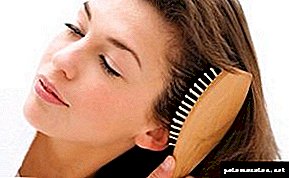
In medicine, trichology deals with the study of the structure of the hair, their physiology and morphology, form and quality. This section of dermatology is responsible for diseases of the scalp and hair zone.
However, the classification in the system of the Ministry of Health still does not exist, so patients often have to register for a consultation with a dermatologist. In this case, the visits will relate to the causes of baldness, diseases of the epidermis of the hair area, treatment of seborrhea and dandruff.
If the problems relate to the quality of the strands - they are dull, lifeless, break, then the dermatologist will not do it. You will still have to look for a trichologist or go back to traditional medicine.
Difference in specialization
A person is constantly changing hair cover - this is a natural physiological process. A few hairs on a comb - this is normal, it is worth sounding the alarm no sooner than 100-120 pieces are noticed per day.
External causes of the disease appear much later - when it becomes visible visually.
Symptoms of a dangerous condition:
- dandruff,
- weakness of keratin rods, their thinning,
- dryness, section of hair,
- slow growth
- alopecia - diffuse, focal, androgenetic,
- loss of density
- seborrhea - dry or oily,
- graying at the age of 16-25 years.

You should also refer to the official medicine, if the disease is parasitic in nature or infectious - there are lice, scabies in the hair zone, subcutaneous mites, signs of depriving. Competence of a dermatologist - examination for alopecia, parasitic and infectious diseases, seborrhea and dandruff. This doctor will treat your head if it can determine the causes of hair loss.
When the factors fail to figure out, then the patient is prescribed consultations from other specialists. They may be gynecologists, endocrinologists, gastroenterologists, infectious disease specialists - even neurologists!
Exhaustion, dullness, brittleness - they can also be associated with problems in other organic systems, so the trichologist also has to treat narrow specialists to treat baldness.
Causes of loss of hair
There are 9 main causes of hair loss, and indicate which doctor treats them.

- Changes in hormonal levels - hormonal failure, natural changes, imbalance. Such changes provoke: increased production of male hormones - androgens, a decrease in the supply of estrogen to the blood - one of the main female hormones, the onset of menopause, pregnancy. If these factors affect the headache problems, you will need to contact a gynecologist or an endocrinologist. Treatment will be administered after an exact clarification of the causes. It should separately dwell on the state of pregnancy. In women, when babies are born, female hormones are intensively produced, and almost no hair loss occurs. After childbirth, the hormonal level is leveling, and at this time there is an increased hair loss, because after a difficult 9 months, you need to update your hair - there are already enough healthy substances in the new strands, they "Fresh"healthy. Therefore, when 2-4 months after birth begins "Molt"don't get scared
- Lack of vitamins. This condition appears when the diet is irrational, it does not have enough nutrients or a diet. "poor". In this case, you need to make "Correct" menu for every day, or contact your gastroenterologist. With many diseases of the stomach, duodenum or liver, useful substances cease to be absorbed into the body, and without solving the main problem to eliminate the destruction of the hair structure is impossible,
- Lifestyle is far from ideal. Bad habits and a long stay in a smoky room or in the absence of fresh air, low-active lifestyle - all this affects the quality of hair. There is no doctor who will drive a pen to walk, play sports or in time to feed healthy food. Normalize the daily routine and meals you need to,
- Improper care of hair. Substandard shampoos or cosmetics for the care of curls, which does not match the type of hair data. Frequent coloring by means of which "Kill" the hair components are ammonia and hydrogen peroxide, thermolining, drying strands, increasing their fragility. This problem will also have to be fought independently, although doctors, a trichologist and a dermatologist, may point out this reason,
- Seasonal loss. In mammals, molting is a natural process. Man also belongs to the class of mammals, and he also has a peculiar molt. The rest of the hair follicles do not always fall on the summer season - each person has his or her own rest time, which is determined by the individual qualities of the organism. In addition, external factors affect hair loss. In the fall, hair falls out due to the increased exposure to ultraviolet radiation in the past summer season, in the winter — if it had to come down with seasonal viruses in the fall, in the spring, change of hair cover — vitamin deficiency after a hard winter, in the summer — if it failed to recover in the spring. Of course, medicine does not solve this problem,
- Stress and neurological problems. In this case, you must contact your neurologist. When neuroses suffer, skin, nails, teeth collapse, as large and peripheral vessels spasm during nervous disorders, nutrition of the upper salt of the epidermis is disturbed,
 Hair loss may be due to taking certain medications or chemotherapy. In the first case, you can contact the doctor who treats the underlying disease, and ask for more benign remedies. In the second, hair loss should not be a factor due to which they can refuse treatment for cancer. If you can get rid of it, the hair will grow,
Hair loss may be due to taking certain medications or chemotherapy. In the first case, you can contact the doctor who treats the underlying disease, and ask for more benign remedies. In the second, hair loss should not be a factor due to which they can refuse treatment for cancer. If you can get rid of it, the hair will grow,- The overall decrease in the immune status of the body. It can be provoked by infectious or chronic diseases, poor ecology - polluted air and water, professional activity. If the immune system suffers from organic problems, you must first contact the therapist so that during the examination the problem is fixed. The same doctor can help get rid of the effects caused by environmental damage,
- Genetic factor. If the parents have bad hair, then it’s ridiculous to expect that the children will have chic hair.
Which doctor to contact, with problems with hair, so that he would suggest the reasons for which you should focus attention? Trichologist - if he is in the staff of the clinic, or a dermatologist or therapist.
Treatment methods
In order to restore the quality of the hair, medical and homeopathic remedies of general effect, preparations of directed external action are prescribed.
Physiotherapy is connected:

- mesotherapy,
- peeling,
- Massage effects of various types - from the massage of the neck area to reflexotherapy,
- laser therapy
- acupuncture,
- treatment of problem areas with liquid nitrogen or other stimulants.
For a long time, one has to undergo a course of vitamin therapy, to follow the recommendations on the attraction of drugs made according to traditional medicine recipes. Hair restoration requires patience. The doctor will not only prescribe medical treatments and procedures that help treat baldness, but also adjust lifestyle.
If the therapy is ineffective, a hair transplant surgery may be necessary.

 Hair loss may be due to taking certain medications or chemotherapy. In the first case, you can contact the doctor who treats the underlying disease, and ask for more benign remedies. In the second, hair loss should not be a factor due to which they can refuse treatment for cancer. If you can get rid of it, the hair will grow,
Hair loss may be due to taking certain medications or chemotherapy. In the first case, you can contact the doctor who treats the underlying disease, and ask for more benign remedies. In the second, hair loss should not be a factor due to which they can refuse treatment for cancer. If you can get rid of it, the hair will grow,